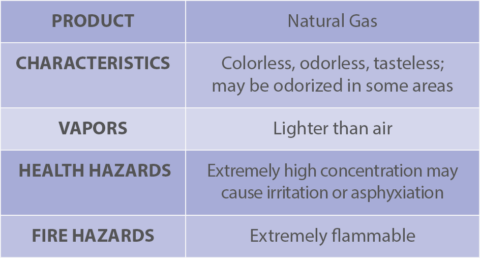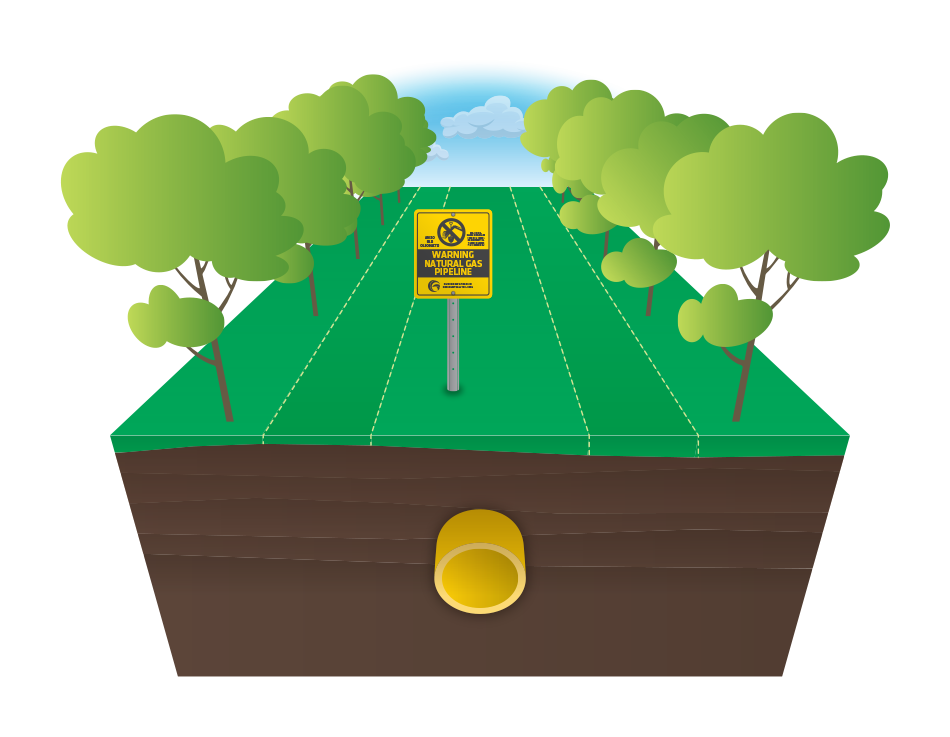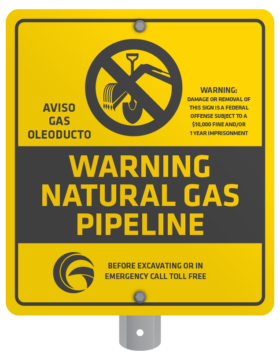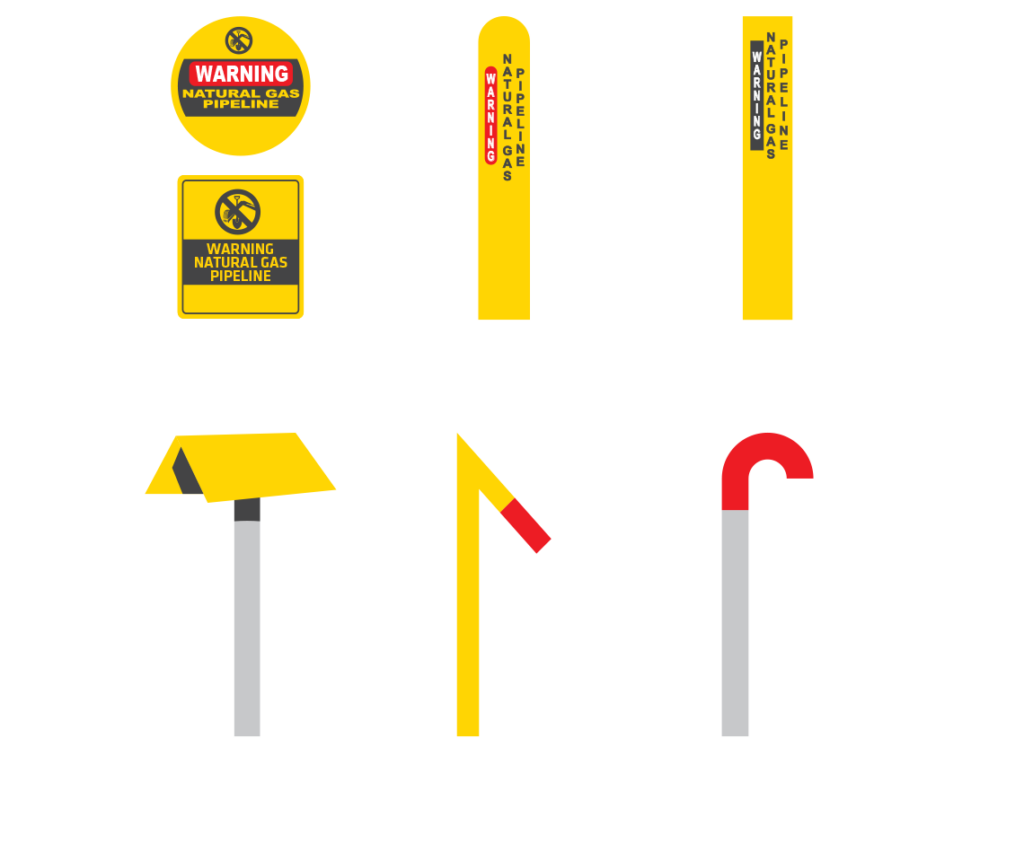
Natural Gas Safety Information
For Excavators
Important Information About Natural Gas Pipeline Safety
Texas Gas Service is committed to constructing and maintaining a natural gas pipeline delivery system that complies with applicable state and federal guidelines, industry standards and safety regulations. Our goal is to deliver safe, affordable and reliable natural gas to the communities we serve. We apply approved pipeline integrity management techniques to monitor system performance and maintain system reliability. Your knowledge and understanding of natural gas pipeline facilities, damage prevention and emergency notification are important elements in protecting pipeline integrity and performance.
Pipeline Purpose and Reliability
Natural gas pipelines provide a safe way to move natural gas from one location to another. In the United States, a vast network of pipelines delivers the many benefits of natural gas to millions of consumers nationwide. Natural gas is a valuable resource for our country’s energy demands. Oklahoma Natural Gas is the largest natural gas distribution company in Texas, serving 699,000 customers across the state.

Awareness of Natural Gas Hazards
Natural gas is lighter than air. It rises and disperses rapidly and requires a specific amount of gas and oxygen to burn. Natural gas is non-toxic but may cause irritation or asphyxiation in extremely high concentrations. Avoid inhalation, move to fresh air and seek medical attention, if necessary.

Contact 811 Before You Dig
Something as simple as repairing a fence, planting a tree and even installing a mailbox can potentially damage a pipeline. If you are planning to dig, bore or perform any excavation activities, know what steps to take to prevent damaging underground utilities. Before you dig, state law requires excavators – including homeowners and DIYers – to contact 811 at least 48 hours, excluding weekends and holidays, before the planned excavation start date to have underground pipelines, cables and other utilities marked for free. Damage from excavation-related activities, particularly from equipment digging or boring into pipelines, is the number one cause of pipeline accidents. To prevent damage to the pipeline, you are required by law to use hand or soft digging techniques when excavating within the tolerance zone – the area within 18 inches from the outside edge of the pipe in all horizontal directions. For more information or to submit a ticket, call 811 or visit texas811.org.

Working Within the Right-Of-Way (ROW)
Our pipelines run under public road rights-of-way (ROW), public utility ROWs and on private ROWs. Managing and maintaining the integrity of the pipeline system is our priority. These ROWs provide access to operate and maintain the pipelines and facilities. Pipeline ROWs should be kept clear of obstructions to enable Texas Gas Service employees and contractors to safely operate, patrol, inspect, maintain and repair the pipelines. It’s important that you do not install or allow installation of any structures, plant trees or shrubs, or store anything that could be an obstruction in the ROW.

If You Disturb or Damage a Pipeline
In the event you cause any type of damage to a pipeline, it’s important you call Texas Gas Service immediately at 800-959-5325.
Even seemingly minor contact, such as a scrape, dent, gouge, crease or cut tracer wire, can be serious because it could result in a future leak or major incident if not inspected and/or repaired. Texas Gas Service will inspect and make repairs to the pipeline to maintain its integrity. If the damage results in the escape of natural gas, leave the area immediately and then call 911, 811 and 800-959-5325. Do not attempt to repair the damage and do not attempt to cover the damage with dirt or other debris. Avoid using any electrical equipment near the damage.
Texas Gas Service Responds to Natural Gas Emergencies
In the event of a natural gas emergency, Texas Gas Service will dispatch emergency personnel immediately. To report a natural gas emergency, leave the area immediately and then call 911 and Texas Gas Serviceat 800-959-5325. Emergency dispatch personnel are on duty 24/7. As a precaution, public safety personnel, citizens and others should not attempt to operate any valves, meters, regulators or any other pipeline equipment. Improper operation of this equipment may cause accidents to occur. Do not attempt to put out natural gas fires. If burning, control secondary fires. If you observe unusual activity near a pipeline, including suspicious excavation, abandoned vehicles, noncompany personnel or noncompany vehicles, immediately call 911 and the Texas Gas Service emergency line at 800-959-5325.
What to Do if You Suspect a Natural Gas Leak
- Turn off and abandon equipment.
- Leave the area immediately.
- Warn others to stay away.
- Call 911 and Texas Gas Service at 800-959-5325 from a safe distance.

The Importance of Pipeline Markers
Pipeline markers are used as warning signs to indicate the presence of a pipeline. However, these markers do not indicate the exact location or depth of a pipeline and may not be present in certain areas. Additionally, the pipeline path may vary between markers. Pipeline markers are helpful in generally locating pipelines, but pipeline operators rely on special equipment and service records to determine the specific location, depth and number of pipelines installed underground.

Look for These Signs
Since most pipelines are buried underground, line markers like the ones shown here are used to indicate the presence of a pipeline. These markers can be found along a street, highway, railway or pipeline right-of-way (ROW) and where a pipeline intersects with a street, highway or railway system. Pipeline markers display the material transported in the line, the name of the pipeline operator and a telephone number where the operator can be reached in the event of an emergency. While these signs indicate the presence of a pipeline, they may not mark their exact location, so you are required to call 811 to have the lines marked prior to any excavation activity.

How to Recognize a Pipeline Leak
Smell: If you smell a rotten egg or sulfur-like odor, it may be the result of a natural gas leak. Natural gas is naturally colorless and odorless, so we add an odorant called mercaptan to warn you of a natural gas leak.
Sight: If you see unexplained dead vegetation, blowing dirt or bubbling puddles of water in or around your yard or your natural gas meter, it may be an indication of a natural gas leak.
Sound: If you hear a hissing or roaring sound near natural gas piping, meters or appliances, it may indicate a natural gas leak.
If you notice any of these warning signs, leave the area immediately. Then call 911 and Texas Gas Service at 800-959-5325.
Pipeline Integrity Management
Texas Gas Service is committed to operating a safe and reliable natural gas pipeline system. Our primary goal is to deliver natural gas safely to our customers. The company’s Pipeline Integrity Management Program meets the requirements identified in 49 CFR Part 192 to implement the “Pipeline Safety Improvement Act of 2002.” Specific practices, processes and procedures have been established to enable the management and execution of the Integrity Management Program. For more information about Texas Gas Service or this message on natural gas safety, visit texasgasservice.com, email PipelineAwareness@onegas.com or call 800-700-2443.
